#hp third generation
Explore tagged Tumblr posts
Text
https://archiveofourown.org/works/57097867/chapters/158814871
Nuevo capítulo de Anécdotas del día a día
Informe
Molly Weasley II, miembro del Wizengamot, está a punto de leer el informe sobre lo que sufrieron sus padres, Percy y Audrey Weasley, durante la Segunda Guerra Mágica.
New chapter of Everyday Anecdotes
Report
Molly Weasley II, a member of the Wizengamot, is about to read the report about what her parents, Percy and Audrey Weasley, suffered during the Second Magic War.
#molly ii#molly weasley ii#third generation#hp third generation#harry potter third generation#audrey x percy#percy weasley#audrey weasley#after second magic war#second magic war#ao3 fanfic#pro severus#fanfiction.net#ao3#wattpad story#wattpad.com#hp fanfic#hp fanfiction
3 notes
·
View notes
Text
The recap of the Marauders era fanon would be that we grabbed Harry Potter's parents and their friends, dipped them into a pool of rainbows and fucking ran with them.
#the first generation of rainbows who produced the second gen of rainbows who produced the third.#oh and the gen before was rainbows too#hp marauders#marauders#dead gay wizards from the 70s#marauders era#jegulus#trans regulus#slytherin skittles#marauders girls#marauders headcanon#wolfstar#dorlene#jegulily#bartylus#rosekiller#nobleflower#pandalily#marylily#quillkiller#partyvan#rosestarkiller#rosestarkillerchaser#bitch these never stop#moonwater#the marauders#the valkyries#minerva x poppy
715 notes
·
View notes
Text
Albus making eye contact with James Sirius in a crowd of laughing students after he was just WINDED by Karl Jenkins and is currently fighting for his life on the hall floor
James Sirius about to comically whistle and look around them then begin muttering something about "how wonderful the walls look today, does Hogwarts have a skin care routine?" before not at all inconspicuously bolting in the other direction
#harry potter#hp#cursed child#hp next gen#harry potter next generation#albus severus potter#albus potter#james sirius potter#i love difficult brotherly relationships#cmon guys jayce couldnt possibly defeat all of Albus' bullies hed have to kill all of Hogwarts#Holy SHIT#ALBUS POTTER VS THE WORLD#they do love each other#but you have to understand#james is in his what? third year?#he has a PERSONA. HE HAS A REPUTATION#and hes barely a teenager#he thinks his brother is just going through some type of hazing process by his yearmates#and by the time he realises its serious Albus has self isolated from everybody#sigh.. idk
53 notes
·
View notes
Text
unfortunately i will not be explainign this either
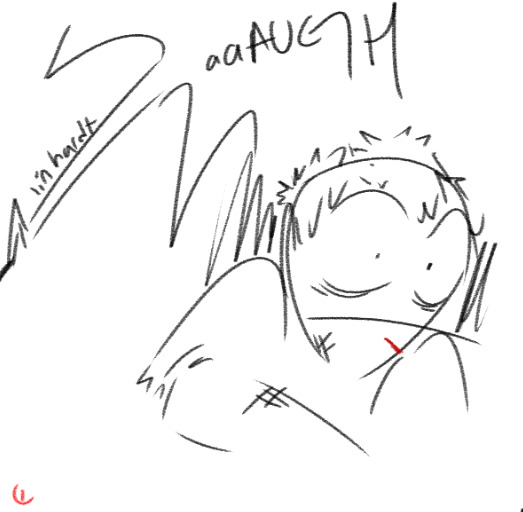
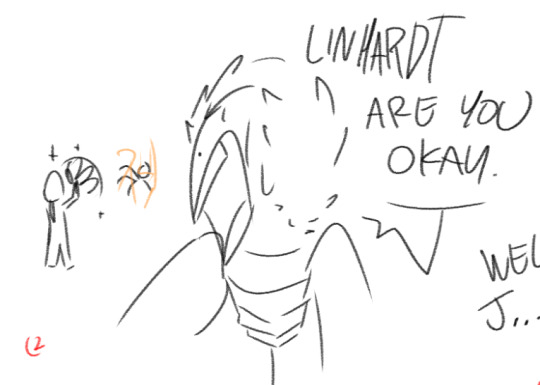
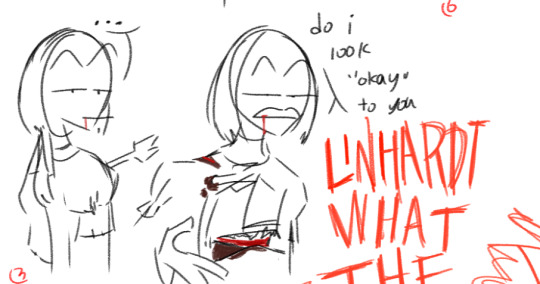
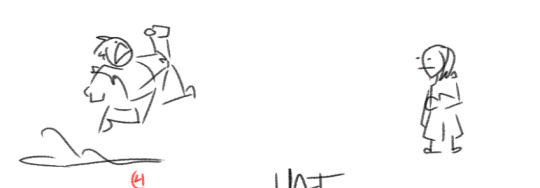
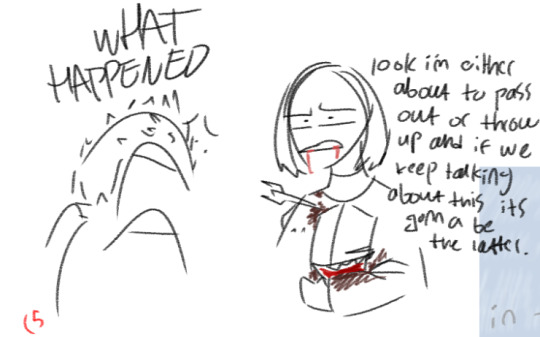
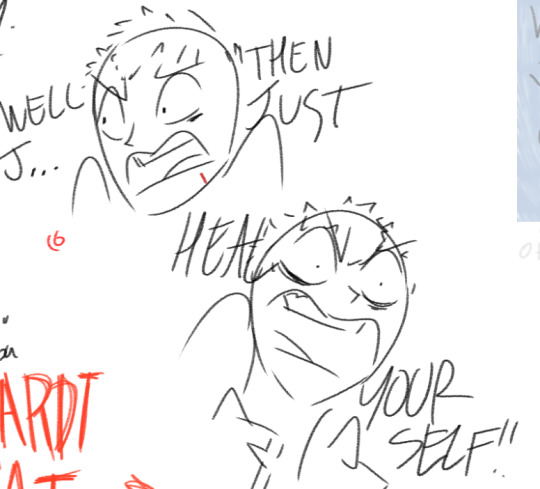


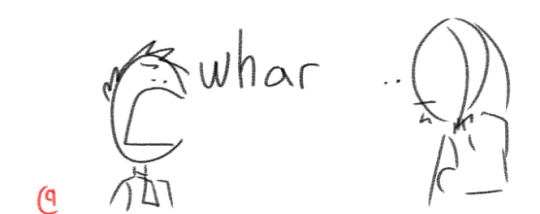

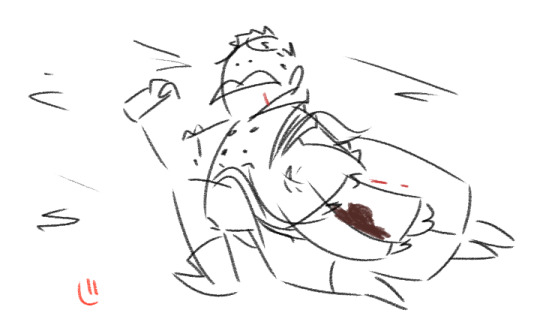
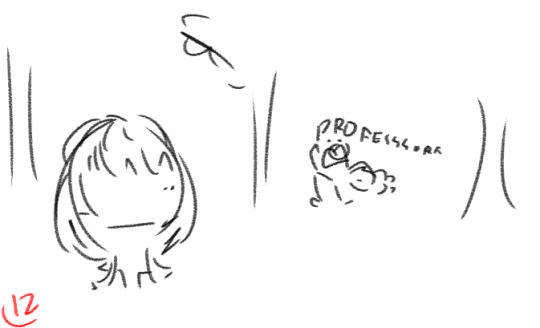
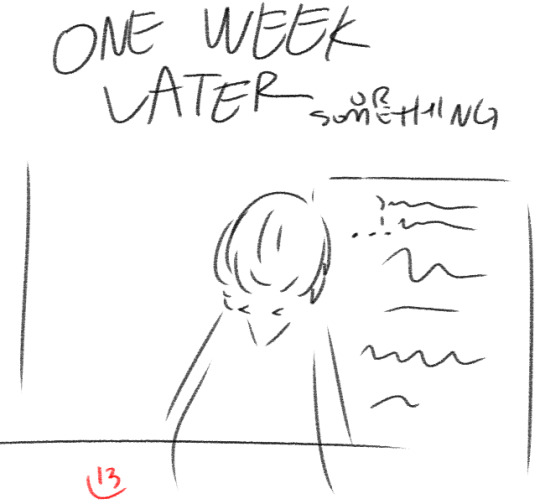

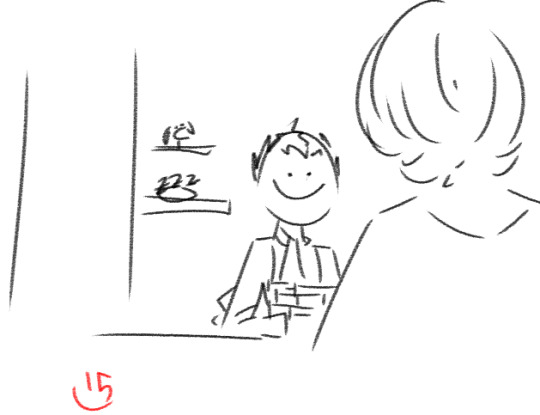
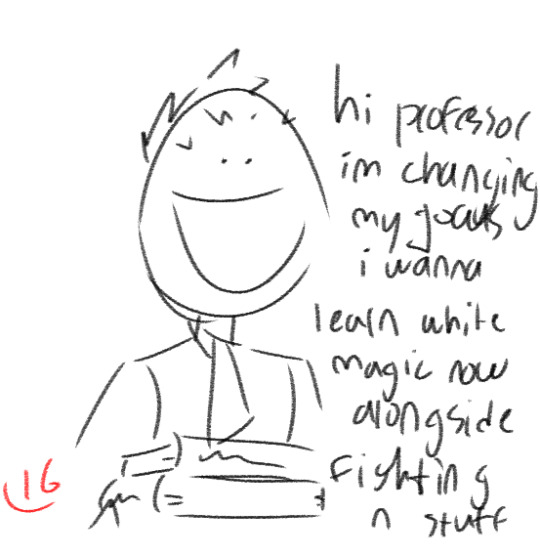

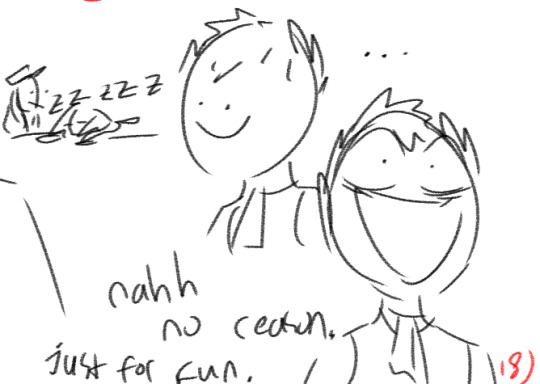


good luck following along, numbering the parts barely helped lol (also my handwriting is a disaster)
#i have a habit of simultaneously taking my art very seriously and not seriously at all#the result is nonsense like this#does. does anyone wanna guess what i had caspar class as ultimately in my second run (and will in my third)#definitely not a class that uses axes/brawling but can also heal#and definitely not for the sole purpose of healing almost exclusively one other certain unit#PRETEND I SPELLED VULNERARIES CORRECTLY LOL#also pretend i remembered the name of healing magic-using classes and didn't just generalize under “healers”...#i do like to think caspar would carry linhardt around like a football#caspar von bergliez#linhardt von hevring#tw blood#cw blood#tw injury#while most of this reflects my second run (AM)#i will say byleth having the all healing items happened more in my first run (CF)#actually that's not quite accurate either - the one who always had healing items was hubert bECAUSE THAT MAN HAS NO HP AND NO DEFENSE.#in all that rambling i nearly forgot to tag the game itself!#fe:3h
28 notes
·
View notes
Text
Hello and welcome to my Ted Talk on why Harry Potter’s 3rd gen should be called
“The Dandelions”
1. dandeLION. yup. you got it. boom.
2. lion being LEO so like, stars and the Black family and shit. Fr what Mr. Albus-Severus-Lily-Luna-Potter shoulda named one of his kids.
3. they’re weeds, they grow in between rocks and rubble -just like growing up in a world devastated by recent war, eh?
4. idk I think it’s cute, fight me
#harry potter#my headcs#headcanon#harry potter headcanon#hp next gen#hp fandom#hp#hp marauders#hp thoughts#harry potter gen 3#hp dandelions#third generation#3rd gen harry potter#wizarding world
3 notes
·
View notes
Note
Where do you fall on the "killing vs. not killing bad guys" argument? I know the debate is complicated and there's a lot of various factors for and against either side, so I wanna hear your take on things.
An intensely complicated subject that tends to get oversimplified on both sides of the equation. I generally don't like to take a "side" on this because I feel like the idea of there being "sides" on killing misses the point.
Unless you're talking about cold-blooded execution of a subdued foe, killing generally isn't a choice you get to make. It's a consequence of the choice you already made to use violence.
While arguments about killing villains exist beyond superhero comics, this is a particular way that they tend to happen in superhero media. Superhero stories depict their heroes as, effectively, SWAT teams. The Green Goblin is about to blow up Newark, so Spider-Man breaks in and smashes his face against a brick wall until he passes out.
Part of the fantasy is the idea that nonlethal violence is easy and reliable. After Spider-Man reduces the Green Goblin's HP to 0, a Windows menu pops up and says "Would you like to finish him?" Spider-Man boldly clicks "No" after every fight like the hero he is.
It allows fans to enjoy brutal takedowns of bad guys without having to reckon with the reality that when Batman brought an entire floor down on top of that guy's head, he probably didn't wake up in a hospital bed. Batman can throw a guy off a third story balcony and watch his knees crack as he hits the ground and the story assures you that he's fine. He'll just need a little stay in the hospital.
But realistically speaking, all of these guys would have body counts. Not because they were aggressively trying to murder, but because you don't really get the choice. It is extremely easy to kill someone and surprisingly difficult to nonlethally incapacitate them. The line between how much blunt-force cranial trauma will knock someone unconscious versus how much will kill them is extremely blurry and it moves.
There are less lethal ways of incapacitating someone than others. Obviously, tasing someone has a lower mortality rate than shooting them with bullets. But the only surefire way to uphold a Code of No-Killing is to not use violence as your problem-solving tool in the first place. And there's not a lot of de-escalation training going around the Avengers Mansion.
So it always just feels kind of self-delusional when superheroes brag about not killing people but their primary mode of problem-solving is to shoot a guy in the face with an exploding arrow or something. You're gonna kill people if you're Batmanning. Sorry, that's just the reality of violence. When you throw a guy off a roof, you don't get to choose what physics is going to do to that sack of meat and bone as it hits the ground.
Now, on the opposite end of the spectrum, should superheroes kill people on purpose? Uh. No. I don't want cops extrajudicially murdering whoever they don't like, and I don't want Batman to do it either. Due process exists for a reason.
Superheroes should not try to kill people. But they are going to kill people sometimes, because their hammer is violence and their stories are just excuses to pit them against nails.
"But the Joker always breaks out of prison." Yeah, but he also always comes back to life. If you can nitpick about genre conventions then I can too. Hell, often times you can't even redeem a villain without the next writer unwriting it and making them a bad guy again. At a metafictional level, there is rarely any way to truly do away with a popular villain.
But. Y'know. Let's talk about heroes who aren't fucking copaganda. In the broader fictional sense, should stories end with the hero killing the villain or shouldn't they?
This, again, has no simple Yes or No answer. It depends heavily on the themes being explored and what the villain is meant to represent.
We need to talk about the "demise" of the villain, which can be a literal death or it can be many other things. The primary function of the villain is to be wrong about something. To oppose the hero, who is right about something.
The villain holds bad ideas, bad beliefs, bad ideology. The hero may start out holding good ideas, or they may be something that the hero comes to over the course of the story. But by the time these two meet in the third act climax, they are meant to embody the two faces of the story's central thesis. Regarding whatever this story is trying to talk about, the hero is right and the villain is wrong.
Whatever form it takes, whether literal death or not, the demise of the villain is the final statement on their incorrect or even toxic beliefs. Which often does take the form of literal death because it's easy to write a comeuppance that way.
Luke Skywalker believes that there is love in his father's heart for him, and Emperor Palpatine is confident that Anakin is truly lost. But Luke's love for his family wins out and destroys Palpatine.
Scar is selfish, cowardly, and disloyal. Simba returns out of a sense of responsibility and loyalty to his people, coming clean to them and accepting his place among them. Scar tries to sell out the hyenas to save his own skin, as well as stabbing Simba in the back. For his treachery, the hyenas rip him to pieces; He is devoured by the very loyalties that he selfishly betrayed.
Obadiah Stane, the embodiment of war profiteering and the military-industrial complex, is literally consumed by the clean energy project that Tony wants to move the company towards instead.
Sauron underestimates the power of the small and meager folk, and believes wholeheartedly in Great Men of History. And so when Great Man Aragorn marches to his gates, he allows himself to become convinced that this is his true nemesis, his true rival, the threat he must face. This is the glorious battle that will decide the fate of Middle-Earth. And so he turns his eye away from the common folk that will be his undoing.
The villain's flaws, their toxic ideology, the things that make them the villain, are what their demise is supposed to be about. They can be consumed by their failings or undone by the hero's virtues, but either way, in a well-executed demise, a closing statement on the story's thesis is made.
But a well-executed demise doesn't necessarily have to be fatal, either. Like I've said, it can be things other than a literal demise. Sometimes it absolutely should.
In Civil War, Zemo is driven by an obsession for revenge. His homicidal retaliatory bloodthirst is a toxin that he infects both T'Challa and Tony with over the course of the story. Tony succumbs and has to be defeated with force, though Steve still demonstrates his strength of character by sparing Tony's life in the end even when the madness of the battle threatens to grip him too.
But it's T'Challa who delivers Zemo's demise. Not by killing him, but by making the choice to rise above vengeance. T'Challa breaks the shackles of Zemo's infectious vengeance and chooses mercy. And it's in this moment that Zemo's feelings, his cruelty, are opposed and vanquished by T'Challa's heroic virtue.
Firelord Ozai believes in the Social Darwinist ideology of Might Makes Right. He leads a culture where disputes are settled with deathmatches and believes it is his right to blanket the world in fire because he has the power to do so, and no one can stop him. Aang, by contrast, is a pacifist at heart because those are the values he was raised in; Values of a culture that Ozai exterminated, whose very last vestiges exist only in Aang's heart.
Ozai would kill Ozai and Azula, who often gets left out of this conversation. Because theirs is a culture where righteousness stands hand-in-hand with brute strength. Where who is right is decided by who is left standing when the dust settles, and who is a pile of ash. Aang defeats Ozai; By Ozai's belief system, Aang is stronger thus Aang is righteous and it is his Conqueror's Right to execute Ozai where he stands.
But Aang doesn't just beat Ozai; He rejects Ozai's way of life. He renounces the belief system of the imperialist colonizer and holds true to the belief system of a people they destroyed. While a simultaneous outcome plays out between Katara and Azula, as Katara similarly chooses mercy once she's obtained a position of power and control over Azula.
Special note also to Zuko who demonstrates that he actually cares more about protecting people than about winning his Glorious Deathmatch of Imperialist Honor. Which also serves as a rejection of Azula's beliefs that relationships are founded on fear and control. Zuko, too, rejects the belief systems of Ozai and Azula and warrants recognition. Ozai would never have taken a hit like that for Azula. Azula would never take a hit like that for Ty Lee.
It's this mercy that breaks the Hundred-Year War, destroying not the perpetrators of it but the very principles on which it is founded. This philosophical annihilation of Azula and Ozai's very understanding of strength and power is their villainous "demise", and weighs far more than just cutting their heads off and calling it a day ever could.
There is no correct answer to whether or not heroes should kill. What matters most is how the demise the writer chooses for the villain reflects upon the story's central ideas and thesis.
1K notes
·
View notes
Text
A sexy, skinny defeat device for your HP ink cartridge

Animals keep evolving into crabs; it's a process called "carcinisation" and it's pretty weird. Crabs just turn out to be extremely evolutionarily fit for our current environment:
https://www.scientificamerican.com/article/why-do-animals-keep-evolving-into-crabs/
By the same token, all kinds of business keep evolving into something like a printer company. It turns out that in this enshittified, poorly regulated, rentier-friendly world, the parasitic, inkjet business model is extremely adaptive. Printerinisation is everywhere.
All that stuff you hate about your car? Trapping you into using their mechanics, spying on you, planned obsolescence? All lifted from the inkjet printer business model:
https://pluralistic.net/2023/07/24/rent-to-pwn/#kitt-is-a-demon
That GE fridge that won't make ice or dispense water unless you spend $50 for a proprietary charcoal filter instead of using a $10 generic? Pure printerism:
https://pluralistic.net/2020/06/12/digital-feudalism/#filtergate
The software update to your Sonos speakers that makes them half as useful and takes away your right to play your stored music, forcing you to buy streaming music subscriptions? Straight out of the HP playbook:
https://www.wired.com/story/sonos-admits-its-recent-app-update-was-a-colossal-mistake/
But as printerinized as all these gadgets are, none can quite attain the level of high enshittification that the OG inkjet bastards attain on a daily basis. In the world championships of effortlessly authentic fuckery, no one can lay a glove on the sociopathic monsters of HP.
For example: when HP wanted to soften us all up for a new world of "subscription ink" (where you have to pre-pay every month for a certain number of pages' worth of printing, which your printer enforces by spying on you and ratting you out to HP over the internet), they offered a "lifetime subscription" plan. With this "lifetime" plan, you paid just once and your HP printer would print out 15 pages a month for so long as you owned your printer, with HP shipping you new ink every time you ran low.
Well, eventually, HP got bored of not making you pay rent on your own fucking printer, so they just turned that plan off. Yeah, it was a lifetime plan, but the "lifetime" in question was the lifetime of HP's patience for not fucking you over, and that patience has the longevity of a mayfly:
https://pluralistic.net/2020/11/06/horrible-products/#inkwars
It would take many pages to list all of HP's sins here. This is a company that ships printers with half-full ink cartridges and charges more than the printer cost to buy a replacement set. The company that won't let you print a black-and-white page if you're out of yellow ink. The company that won't let you scan or send a fax if you're out of any of your ink.
They make you "recalibrate" your printer or "clean your heads" by forcing you to print sheets of ink-dense paper. They also refuse to let you use your ink cartridges after they "expire."
HP raised the price of ink to over $10,000 per gallon, then went to war against third-party ink cartridge makers, cartridge remanufacturers, and cartridge refillers. They added "security chips" to their cartridges whose job was to watch the ink levels in your cartridge and, when they dip below a certain level (long before the cartridge is actually empty), declare the cartridge to be dry and permanently out of use.
Even if you refill that cartridge, it will still declare itself to be empty to your printer, which will therefore refuse to print.
Third party ink companies have options here. One thing they could do is reverse-engineer the security chip, and make compatible ones that say, "Actually, I'm full." The problem with this is that laws like Section 1201 of the Digital Millennium Copyright Act (DMCA) potentially makes this into a felony punishable by a five-year prison sentence and a $500k fine, for a first offense.
DMCA 1201 bans bypassing "an effective means of access control" to a copyrighted work. So if HP writes a copyrighted "I'm empty" program for its security chip and then adds some kind of access restriction to prevent you from dumping and reverse-engineering that program, you can end up a felon, thanks to the DMCA.
Another countermove is to harvest security chips out of dead cartridges that have been sent overseas as e-waste (one consequence of HP's $10,000/gallon ink racket is that it generates mountains of immortal, toxic e-waste that mostly ends up poisoning poor countries in the global south). These can be integrated into new cartridges, or remanufactured ones.
In practice, ink companies do all of this and more, and total normie HP printer owners go to extremely improbable lengths to find third party ink cartridges and figure out how to use them. It turns out that even people who find technology tinkering intimidating or confusing or dull can be motivated to learn and practice a lot of esoteric tech stuff as an alternative to paying $10,000/gallon for colored water.
HP has lots of countermoves for this. One truly unhinged piece of fuckery is to ask Customs and Border Patrol to block third-party ink cartridges with genuine HP security chips that have been pried loose from e-waste shipments. HP claims that these are "counterfeits" (because they were removed and re-used without permission), even though they came out of real HP cartridges, and CBP takes them at their word, seizing shipments.
Even sleazier: HP pushes out fake security updates to its printers. You get a message telling you there's an urgent security update, you click OK, and your printer shows you a downloading/installing progress bar and reboots itself. As far as you can tell, nothing has changed. But these aren't "security" updates, they're updates that block third-party ink, and HP has designed them not to kick in for several months. That way, HP owners who get tricked into installing this downgrade don't raise hell online and warn everyone else until they've installed it too, and it's too late:
https://www.eff.org/deeplinks/2020/11/ink-stained-wretches-battle-soul-digital-freedom-taking-place-inside-your-printer
This is the infectious pathogen business model: one reason covid spread so quickly was that people were infectious before they developed symptoms. That meant that the virus could spread before the spreader knew they had it. By adding a long fuse to its logic bomb, HP greatly increases the spread of its malware.
But life finds a way. $10,000/gallon ink is an irresistible target for tinkerers, security researchers and competitors. Necessity may be the mother of invention, but the true parent of jaw-dropping ingenuity is callous, sadistic greed. That's why America's army of prisoners are the source of so many of the most beautiful and exciting forms of innovation seen today:
https://pluralistic.net/2021/06/09/king-rat/#mother-of-invention
Despite harsh legal penalties and the vast resources of HP, third-party ink continues to thrive, and every time HP figures out how to block one technique, three even cooler ones pop up.
Last week, Jay Summet published a video tearing down a third-party ink cartridge compatible with an HP 61XL:
https://www.youtube.com/watch?v=h0ya184uaTE
The third-party cartridge has what appears to be a genuine HP security chip, but it is overlaid with a paper-thin, flexible, adhesive-backed circuit board that is skinny enough that the cartridge still fits in an HP printer.
This flexible circuit board has its own little microchip. Summet theorizes that it is designed to pass the "are you a real HP cartridge" challenge pass to the security chip, but to block the followup "are you empty or full?" message. When the printer issues that challenge, the "man in the middle" chip answers, "Oh, I'm definitely full."
In their writeup, Hackaday identifies the chip as "a single IC in a QFN package." This is just so clever and delightful:
https://hackaday.com/2024/09/28/man-in-the-middle-pcb-unlocks-hp-ink-cartridges/
Hackaday also notes that HP CEO Enrique J Lores recently threatened to brick any printer discovered to be using third-party ink:
https://arstechnica.com/gadgets/2024/01/hp-ceo-blocking-third-party-ink-from-printers-fights-viruses/
As William Gibson famously quipped, "the future is here, it's just not evenly distributed." As our enshittification-rich environment drives more and more companies to evolve into rent-seeking enterprises through printerinisation, HP offers us a glimpse of the horrors of the late enshittocene.
It's just as Orwell prophesied: "If you want a picture of the future, imagine a HP installing malware on your printer to force you to spend $10,000/gallon on ink – forever."

Tor Books as just published two new, free LITTLE BROTHER stories: VIGILANT, about creepy surveillance in distance education; and SPILL, about oil pipelines and indigenous landback.
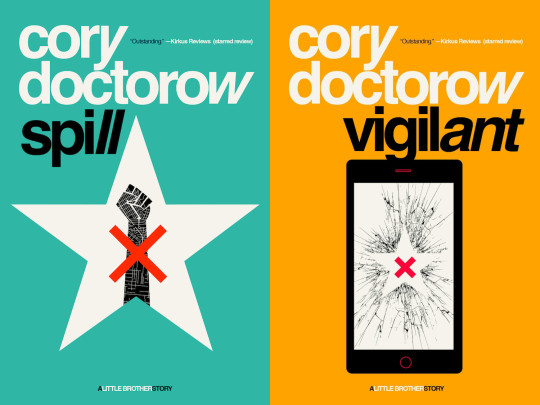

If you'd like an essay-formatted version of this post to read or share, here's a link to it on pluralistic.net, my surveillance-free, ad-free, tracker-free blog:
https://pluralistic.net/2024/09/30/life-finds-a-way/#ink-stained-wretches

Image: Jay Summet https://www.youtube.com/watch?v=h0ya184uaTE
4K notes
·
View notes
Text
There's no time to explain who am I, so im gonna show you my own take on Horrortale Yellow.

This au's name doesn't need to be explained, the underground sets in an uncanny ambient after a neutral route in general, but based on Undertale Yellow's timeline, the underground sets in this ambient after a neutral route made by Integrity.
Each area like The Dark Ruins and Snowfall (Lower Snowdin) are based on the horsemen of the apocalypse in order: Death (Ruins), Pestilence (Snowdin), Famine (Dunes/The Wild East), War (Steamworks and UG Apartments), and finally, the last area called "Clover's judgement" can be heaven or hell depending of the route (genocide, neutral or pacifist (NOT FLAWED), where your fate will be sealed if you choose to fight Zenith Martlet, Kitsune Ceroba or Flowey.
Monsters CAN bleed in this au if they arent at a very low HP but still damaged, if they lost all their HP they turn into dust normally along with the blood.
I dont have enough energy to explain every character's deep lore on this au, so im gonna say their general characteristics:
Clover is 10-years old, they escaped from home and fell from a mountain on accident, without having any bandages or any gun, they have to dodge every attack to not to die. They fell in a flower bed that had spines on it, making them lose a part of their vision and getting hurt, leaving them with a very low HP permanently at the beginning.
Dalv is a REAL vampire this time, he will try to attack Clover no matter if theyre friends or not, but Dalv knows is better for Clover to leave his house for their own good if they want to survive. Dalv is selectively mute and has vampire urges that need to be satisfied. He lost a horn in a fight that he doesnt remember.
Martlet lives in Snowfall where there is a fungus infection that was born after the dust mixed with very cold snow on trees that made a fungus live on fruits and honey panels. Martlet is infected and a bit hungry, but she would never attack a poor child. She's vulnerable to cold and diseases, she's is in the late-third phase of infection where fungus take place on her physical body and cant fly.
Ceroba lives in the dunes where everyone fights and eat themselves to survive, concluding on cannibalism and blood, everyone is hungry and will attack anyone who steps on the area. Ceroba has a scar on her left eye like Clover and has insomnia to protect Kanako and Chujin, who are alive but need to be feed. She has SEVERE problems with Orion (Starlo's brother).
Axis was created after Integrity's neutral route where The Integrity Incident never happened, Axis serves as a doctor and emergency robot, when he was closed in the Steamworks, the Steamworks and UG Apartments summerged on war due to being trapped by their own creators. Axis is mute due to his "radio" being damaged, he is a pacifist and tries to help Clover until Clover and Ceroba wrongly attack him.
I will drop more information later, but these are the most important ones. The others who I didnt included (Decibat, El Bailador, Starlo, Orion, along with others) are secondary or important to a specific character's development. Here are the old designs, some of them stay the same and others changed a little bit or generally.

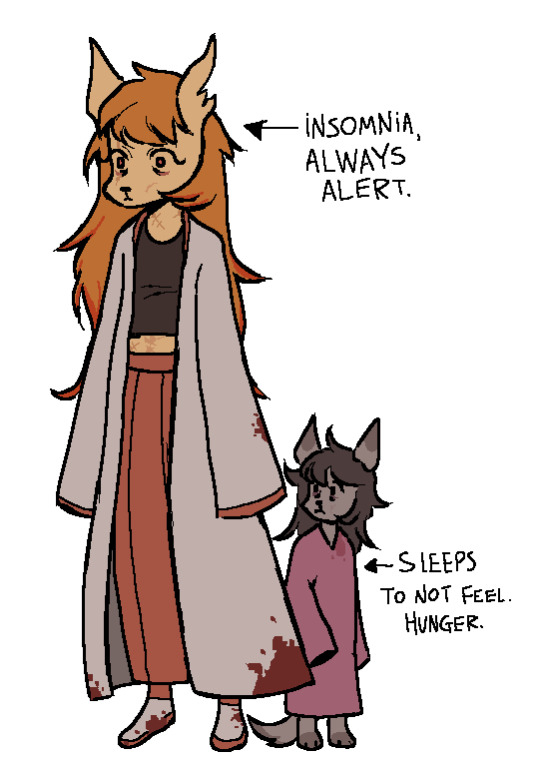
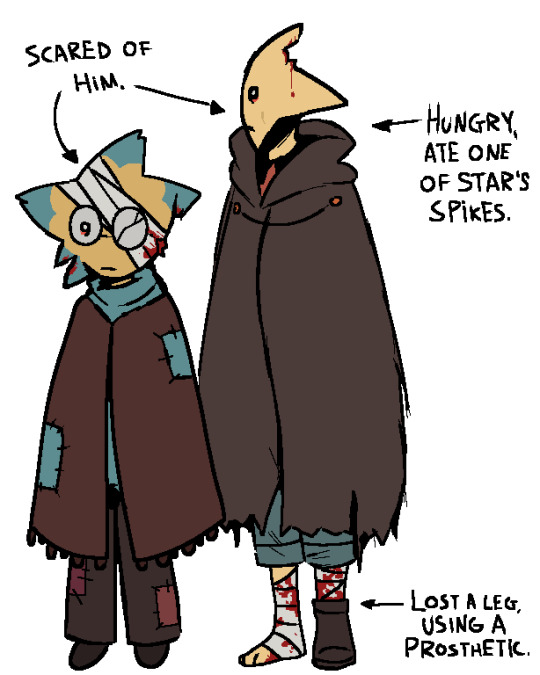

#this gonna flop but idc#undertale yellow#uty dalv#uty ceroba#uty clover#uty fanart#uty au#uty flowey#im just a boy (neutral gender)#only tagged the characters showed in the image#uty#ut yellow
569 notes
·
View notes
Text
STORED DATABASE - A Forsaken fic
Silly ver. (A bit different from what I'd write but I had this idea since before and it seems like a fun one.)

How did this happen again?
Elliot baking a pizza pie with Noob helping him - How cute.
Guest and Chance playing Video games on your console - Chance won.
007n7 and c00lkidd making paper airplanes from your money - You don't mind but what a waste.
1x1x1x1 and Two Time watching a movie beside you - How Homey.
Dussekar decorating his own room with magic - Hey a room doesn't decorate itself... Does it?
Shedletsky and Builderman talking to each other - Borinnnngggg.
Mafioso? You forget how he's even here in the first place is probably thinking of taking your money through a elaborately planned debt making machine - Scary...
Jason? Cutting up meat for our dinner later - How nice of him <3
Lastly, John Doe wait where is he? Oh, right he's taking a nap after running for a while. - What or where was he running from again?
You shake your head repeatedly which makes Two Time look at you he tilted his head a bit and asked "You okay? You've been out of it since yesterday." 1x1x1x1 then held your face between their hands and made you face the channel which you were watching the movie off of "Focus on the movie. It's getting to the good part where his guts are spilled all over the floor." The zipper on their mouth making a little 'jingle' as they chuckle seemingly more interested in the movie than what you're thinking about. You forgot you were watching a scary movie about cultists no wonder why the elusive awkward Two Time asked to join you in your activities due to the fact he wanted to see how humans make offerings to their creators so to say the least he is not impressed a bit uncomfortable to say the least but since you're there he stays. "Interesting way of offering a person..." 1x1x1x1 looked at Two Time who seemed completely uncomfortable with the movie and whispered into your ear "He's a bit of a freak isn't he? If he doesn't like it, why is he staying?" A bit put off by his behavior 1x1x1x1 decided to switch his focus back on the movie. You slump on your sit and sigh. How did things come to this? You let your mind wonder to when this all started. It all started when.....
Flashback
"BRO THROW THE PIZZA YOU LITTLE S#!5" you screamed at your computer as you watch another Elliot who clearly has their ability ready not use it when you're literally on the verge of entering the pearly red gates of hell after thinking on what you're gonna do with this Elliot post-game. "OH MY GOD YOU ################" You somehow got tagged in real life for saying the most obscene and horrible curse known to mankind which was honestly a feat in of its own.
You sighed as you watch your character die to the killer The Elliot somehow facing a LMS with 1% of his hp, you chuckled and thought 'Hope he doesn't even last a second.' You were a normal person except for the fact you were extremely rich... Too rich infact you could basically give 50 people enough money to be rich for 10 generations back-to-back how you might ask? Well, it's because of your truly goated mindset of 'Money first, Games second, Love third.' hence you winning the lottery 9 times in a row which is insane if you think about it and another reason why you're utterly single and alone in your giant when I mean giant, I mean GIANT mansion. 'Oh well other people drag me down anyway.' focusing back onto the game you could see Elliot being murdered by John Doe which made you chuckle as a random pop-up randomly appears on your screen which seems to be a server wide announcement of forsaken shutting down temporarily due to data issues which made you gasp in horror 'Not your favourite game!' you panicked as you thought about what to do in the next 5 minutes without your favourite game plaguing your mind just like how food runs your thoughts.
The game seemingly frozen now at the spectator screen of you watching John Doe raise Elliot up from the ground as he's about to stab his spiky spike into his abdomen you sigh as you try to quit but no avail... Okay? Anyways as you were about to leave your laptop and go get some food another pop up arrives
Would you like to save the database into your home? Don't worry you'll be completely safe.
Yes / No
Huh? What a weird pop-up doesn't this just mean we're saving our data incase we lose it and how agreeing to this will keep my data safe? What weird wording from the Devs(Okay grammar police). You didn't pay much attention to it as you just pressed Yes and then a blinding light enters your room you close your eyes in reflex and open them again to see a humanized version of John doe and Elliot (still same skin color ofc) Infront of you still in the pose of absolute being murdered Elliot was squirming as John Doe was about to stab him with the spike, John Doe realizing they're not in the same place anymore looked around the surroundings until he set his eyes onto you. You being flabbergasted could only say one word to express your ever yapping self.
"Whaaaaaaaaaaaat."

Notes:
Something different from what I'd usually write but here it is! Something silly and fun to balance from the major angst I plan to do in my other fic. This will be more lighthearted and a tad bit ooc depends if I see fit.
TAGLIST (DO I EVEN TAGLIST SINCE THIS IS A NEW FIC?)
SO so so sorry if you didn't wanna be tagged in another story pls tell me and I'll remove if you want :pray:
@brain4stew @yukinaabutlazy @ilikedrinkingsoda @oniadopts @no-hearts-included
Edit: As I keep looking more onto it, I don't really like two time liking human rituals it doesn't feel right so It'll be edited! I'm a sucker for my ideals and even if I did think it's silly at the time, my brain and heart nags me to change it </3
169 notes
·
View notes
Text
self aware!m!rover x fem!reader
For a long time he felt alone, until you came along. The moment he could sense you take control of some of his movements and dialogue, he felt ... at peace. It was a feeling that he had been longing for.
He wasn't alone when he was traveling now, he didn't have to worry about companions that would come and go, and most importantly you would remain a constant during his journey, well, until he felt someone else take control.
He knew this person, your brother, you had complained about frequently when he would get on your nerves.
"Don't change my builds, ok? I just got Rover how I want him."
"You still main rover," your brother sounded surprised and a bit teasing as he moved rover around on the screen, much to Rover's dismay.
"He's my favorite character!"
"And here i thought it was Jiyan," your brother stated as he moved to a group of enemies.
Rover could see and hear your hesitation as your brother pressed down on the attack button.
"Well, Jiyan is pretty cool too," you muttered.
And rover could understand, to be honest, he always felt like he was competing for your attention anytime the general showed up on screen.
But moving on, Rover was starting to get tired of your brother. He didn't have the skills as you did. You were always careful to dodge and make sure a hit never landed on him, but your brother played with reckless abandon to the point that Rover's hp bar only a third full.
"Whatever you say, sis- Ow! The fuck?!"
He dropped the controller as you frowned and picked it up.
"What is it?"
"Your damn controller shocked me!"
Your brother rubbed his hand as he stood up to go "nurse" his hand. But you didn't see anything wrong with it anyway.
You rolled your eyes, "what a baby."
Turning to the screen, you hit the map button to teleport so Rover could be at full health.
Rover was glad you were in control again.
#wuwa#wuthering waves#rover#male rover#wuwa rover#wuthering waves rover#rover x you#rover x reader#rover x y/n
316 notes
·
View notes
Text
https://archiveofourown.org/works/66497521/chapters/171647551
Lysander Scamander y Sculptor Nott tienen su primera cita en Hogsmeade.
#lysander#lysander scamander#sculptor nott#nott family#scamander brothers#scamander twins#scamander family#gay men#gay love#gay#gay pride#hp third generation#hp next gen#hp fanfiction#ao3 fanfic#fanfiction.net#ao3#wattpad.com#wattpad#slytherin house#slytherin#ravenclaw house#ravenclaw
0 notes
Text
My response to some "critics" about Babel
Okay, I'm gonna start by saying this: English is not my first language so I may commit some spelling and grammar mistakes here but I felt like I just had to write this down, especially because of the negative reviews this book has that just… didn't get it.
Don't get me wrong, of course you're allowed to not like this book, I recognize that it's most certainly not gonna be everyone's cup of tea but some of the people here just didn't get what this book was all about. Babel isn't a fantasy like ACOTAR, or HP, or whatever (in the sense that, for those, the story guides the message while Babel is the contrary): like many classical books, Babel was written to make a point, it's a romance, sure, but it was written to argue for something - the necessity of violence.
So, first of all: Babel is a historical fantasy, it talks about colonialism, racism, sexism, and other matters with no qualms, no embellishing to make it digestible, no allegories or metaphors because this isn't the point. Kuang's "lack of nuance" as someone here pointed out is very deliberate and extremely important for the story because the points she wants to make are always lost in nuance (just think how many people go on misinterpreting Star Wars, Hunger Games, or even anti-system songs like The Wall ffs), and the message is too important to get lost in allegories.
Second, as to the story, many people seem to think what she's pointing out is obvious "ur dur colonialism is bad, we get it". No, you clearly don't. There's a profound difference between getting it and actually comprehending it to an elemental level. Robin's travel to Canton illustrates that perfectly: he knew that colonialism was bad, he knew it was violent but he didn't comprehend it until he was forced to face it happening in front of him - to people who could've been easily him. More than that, because that was when he finally connected the theory with the reality, it became palpable to him.
It's not enough to get it, you have to actually stay attuned to it, to feel the flow of its violence throughout the world because then, and only then, I'll realize you can't be complacent, you can't turn your head from it. And Babel is an attempt, however tiny, of showing this to you. Of telling you "Look, you're ignoring it, the discomfort you felt reading this is your conscience telling you you relate to that". So no, I refuse to accept that Kuang should have been more nuanced: she was as clear as she could because she knows people say they get it but they don't, not really.
Third, the magical system is just chef's kiss. I've seen many people complaining about it but the thing is: the silver working is not about having magic in the world, it's about creating a palpable, material place where Kuang could center her attention as she talked about the economic aspect of colonialism. That's because colonial power is not centered in one place or thing, it is scattered all around but you can't hardly make a point like Babel's if you have your characters fighting off colonialism in all corners of the world. Like the Capital in the Hunger Games, Babel is a material place that symbolizes something.
Moreover, the silver working symbolizes the Industrial Revolution and its need for the advance of colonialism. More than that, silver-working is about capital, it's about technology to generate more profit, quicker, for a specific class that doesn't care who they have to kill to continue, doesn't care whether it is good or bad for the common folk.
Fourth, many people pointed out how academic Kuang's writing style felt during Babel and they're right, it is indeed very identifiable. I'm sure I even commented something along the lines of "it feels like I'm having the best History lesson of all time". But I'm going to challenge people who say things against the notion that the historical description of Kuang was unnecessary: every time Kuang chose to give the readers historical context has served somehow to the narrative.
I remember early on in the book when Robin was still a teen walking through London and reading anything he could put his hands on, and then we get two paragraphs of historical and political context for the time, then Robin comments that he didn't understand why this mattered so much. That paragraph served so much, both because it made us know a little more about Robin and because it served to make us understand the profound environmental change England was going through at the time.
And every time she did this, it served for something. Again, Babel is a historical fantasy, it is supposed to make you think about the point Kuang is trying to make but you won't understand it if you don't know the context of which Robin and the other characters in the book are coming from. It was a time of decision: either England would consolidate itself as an almost all-powerful oppressor, or it could go down… if the oppressed people - who share a common enemy - understood their responsibility to do something.
The strikes of the English working class, the violent acts of rioters, the advancement in technology, the possibility of the Opium War, the colonialism… it's all important. It's important because it allows us to understand the deep connection between it all. It allows us to understand who profits off of it, and who doesn't; who is able to understand and who isn't. It's why Letty is upper-class. It's why Abel isn't.
It's not as simple as some people think to understand colonialism, the flows through which one thing is tied to another. Why do people ask "How does this affect me?" when we point out deeply unfair things like unpaid maternity leave (I actually saw an American once saying she "wouldn't want her tax money to go to someone who didn't plan through"), like the fact people starve when we have the ability to feed a world and a half, of that Palestine is going through ethnic cleansing? Because they are unable to understand how closely their lives are tied to other peoples they have never met and probably never will.
Kuang's message is not "colonialism is bad", she's saying "These are all the forms through which colonialism is bad to everyone but a few, do something about it", she's saying "Every single one of your struggles is tied together in more ways than you even understand. A person in Haiti, in China, in India, in the other side of the world, has more to do with you than these white rich people, fight with them, stand with them."
Fifth, I can't believe I gotta say this but I'm not going to even bother with you if you think this book is somehow "anti-white": just get over your main character syndrome. We're talking about a historical fantasy set in England in the epitome of colonialism through the eyes of a person of color. Of course, most white people are gonna be bad, get over yourself ffs!
The actual entitlement to the protagonism white people have is maddening. As a white woman (in Brazil, at least), I'm ashamed of some comments here. It's not because white people in this book are majorly racist (which, according to the setting is 100% accurate) that Kuang is talking about you (although, if you're so bothered by it, it's probably about you anyway). This is a book about the experience of people of color under the oppression of colonialism: white people are the problem!
You can't just expect someone to write about colonialism and not talk majorly about race. White people reap all the privileges of this system and not just that, they are responsible for it, and all the crying about being the bad guys is just insufferable (they're actually so right about having to console Letty once she learns about the racism they suffer).
Be f*ing accountable for your privileges, take responsibility for your internalized racism, and be accountable for the system that privileges you. It doesn't matter that it wasn't your fault, that you didn't set up the system, you still benefit from it anyway so get a grip. This story isn't about you at all, it isn't about how some white people fought against slavery or oppression, it isn't about you.
Let's be very clear about this: most white people who fought against slavery did so to serve their own interests, exactly as Kuang points out. This doesn't mean none of them were good people who actually believed slavery was bad but we're talking of a time when racism and racial discrimination weren't even discussed seriously. Most white people, even the ones against slavery would have a deeply ingrained racism in them, so get real.
More than that, though: if those people who actually have no shame in saying Babel is "anti-white" had actually read the book through, they would know that some white people actually help and are good people in the story.
Anyway, Babel is so good, it's so painfully real and so passionately well-written. You can feel Kuang's love for her people, the struggles of what it means to love something but still not be a part of it, the deep understanding of how the world works, and how intricately every single thing in our lives is.
I just felt so heard (as a person from a third-world country) reading Babel, like someone was telling me all this rage and indignation I feel is justified, it's valid. I just treasured it so much, how I identified with Robin's need for security contrasting with his indignation for the price of it; with the rage Griffin carried around him, sharpened and well-directed even in its volition; with the love Victoire had to learn to have for her country and its story; with all the pain I was able to share with someone who understood it.
It's an honor to allow words to change me so fundamentally. It's humbling to realize I'm not alone, that my actions and my feelings are shared by other people. It is really precious, you know, to be able to become a better person than I was before because of a book.
#bookworm#writers#bookblr#booklr#books and reading#story writing#writers block#dark acadamia aesthetic#book analysis#babel rf kuang#babel or the necessity of violence#babel an arcane history#babel#dark academia#robin swift#ramiz rafi mirza#ramy mirza#letty price#letitia price#victoire desgraves#rf kuang
351 notes
·
View notes
Note
Sorry if it's a silly question, as I'm still reading the book and haven't gotten to the full scope of the Narrator's job yet, but how 'long' are Eureka! games designed to go on for in-world wise - and more importantly, how alive are Investigators supposed to stay, generally? For context: I'd like to do multiple smaller investigations that are part of a larger conspiracy, individual mysteries that may fail or succeed at being uncovered, that give out pieces of what's actually going on. And, because progression (level-ups, new toys/weapons, etc.) are a big part of what appeals to my players, I think they'd prefer to keep their characters relatively alive to enjoy the benefits, and not replace them through multiple investigations. Is Eureka! able to be played like that? A broader campaign with "meta"/character progression for not being brash and getting yourself killed?
Like most TTRPGs they are billed as “highly lethal,” the truth is that Eureka: Investigative Urban Fantasy is really more “potentially lethal.”
Every character has 5 Penetrative HP and they die instantly if this hits 0, and any bullet deals 4 Penetrative Damage. The most common handguns in Eureka are capable of firing up to 4 bullets in a single action, so yeah, PCs can die pretty easily. They can also kill pretty easily, and it is up to them, not the GM, to make sure they don’t get killed.
Despite this, having played Eureka myself about... 15 times maybe? I have never once personally seen a PC death.
A good number of PCs have died in other people’s Eureka games that I know of, but off the top of my head it feels like around a third of those were killed by other PCs.
The thing is, when the players know the game is lethal, and the PCs know what they’re doing is dangerous, they both tend to be very careful, and a good lethal game will provide lots or mechanics that allow PCs to mitigate the danger. For instance, Eureka is primarily about investigation. The chances that the PCs will get involved in a shootout in any given session is very slim. Most Eureka adventures end up having between 0 and 2 instances of violent danger across the entire adventure. Additionally, that combat is mechanically deep. It is this depth that allows the PCs to make smart and informed decisions that make them less likely to die. For instance, cover mechanics and incremental range penalties that make those 4 bullets each a lot less likely to hit.
As for in-world length, that really depends of course, but we find that many of the game’s mechanics are best suited for adventures that last about 2-14 in-game days. The stuff that characters do in Eureka is usually a short, but extraordinary period of their lives.
That doesn’t mean that they can’t return for another aventure later, it just means that if you’re going to try to run a real big mystery, running it as several smaller mysteries is definitely the best way to do it. Just make absolutely sure that no one of those smaller mysteries needs to be solved or completed a certain way, or in fact needs to be be completed or solved at all, for anything about the larger mystery to work. In Eureka, success is never a guarantee.
This is a good thing, because it means that accomplishments are real, but also, Eureka is deliberately set up so that there’s entertainment value in seeing the PCs involve themselves in and be affected by the mystery, regardless of if they succeed or not, or even if they survive.
Another thing that you as GM I’ll need to do to run this kind of campaign is to make sure you know ALL the facts of the mystery before it starts. This is not something you can make up as you go along. This doesn’t mean coming up with the plot or how the PCs will solve the mystery, in fact you as GM shouldn’t interfere with that all, but you need to know exactly what the bad guys have done, are doing, and will do, and what evidence their doing has left behind. This means you’ll be prepared for whatever the PCs start snooping about, and if they do ask a question you didn’t anticipate, you’ll be able to answer from a place of knowledge informed by the existing facts you did write, rather than making something up completely.

#eureka#eureka: investigative urban fantasy#eureka ttrpg#indie ttrpg#ttrpg tumblr#ttrpg community#rpg#ttrpg#tabletop rpg#ttrpg design#ttrpgs#indie ttrpgs#roleplaying game#rpgs#urban fantasy#conspiracy#conspiracy theories#mystery#investigation#tabletop
100 notes
·
View notes
Text








This is the second volume of Call of Cthulhu adventures produced by Miskatonic River Press. The press itself was founded by Keith Herber to continue to compliment his Lovecraft Country line of sourcebooks for Chaosium with ever more scenarios — the first volume of which was New Tales of the Miskatonic Valley. Unfortunately, Herber passed away soon after the book came out. This volume, More Adventures in Arkham Country (2010) is dedicated to his memory.
The book opens with a fun scenario involving a plant god and an explanation for the extinction of the dinosaurs. Second is a sort of inside-out Scooby-Doo mystery, in which there really is something horrible going on beyond the fake haunting. Third is a sort of cosmic riff on “this is not a place of honor” involving containment of a horrible creature by the mi-go long before mankind. Next is an odd one involving Leonardo Da Vinci’s brother, a machine for Armageddon and Nyarlathotep — in execution it feels like a combo of Dead Light and Saturnine Chalice. Next uses a heatwave, local legends and witchcraft to excellent, folk horror-ish effect when history repeats. The book wraps up with a twisted Innsmouth love story that wasn’t for me.
This volume is very good. I liked the first one, but the adventures here feel more usable in general games, where the scenarios in the first seemed geared for one-shots. These almost all make use of established Lovecraft cities, which is another odd contrast with the first book.
Good art and production design throughout. Andrew Leman of the HP Lovecraft Historical Society designed the handouts, which are lovely. Interior art is split between Jason Eckhardt and Reuben Dodd. I love Santiago Caruso’s cover — it rivals Eckhardt’s own Innsmouth illustrations in both the atmosphere of decay and its oddness.
#roleplaying game#tabletop rpg#dungeons & dragons#rpg#d&d#ttrpg#Call Of Cthulhu#More Adventures In Arkham Country#Miskatonic River Press
109 notes
·
View notes
Text
I want to be really real with you all because I’m well aware that the reason most people followed me between 2016 and 2019 was because of my Fantastic Beasts / Newtina fics, and because I need to get it off my chest anyway.
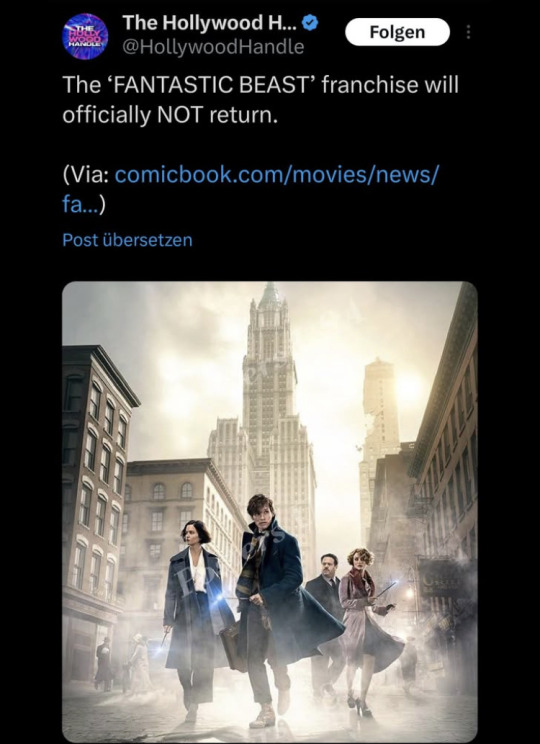
(This is a screenshot of a post sent to me by one of my friends on Instagram, hence the language difference)
I’m not terribly shocked that it appears that we’ll never get another Fantastic Beasts film again. The last two underperformed considerably compared to the first film, and both were in general less well-received by both the critics and the general audience than the first film. While the third film was overall an improvement in many ways, it still wasn’t the same caliber as the first FB, let alone the eight Harry Potter movies before it.
I am in two minds about this: on the one hand, I completely agree that we need to stop giving that woman money - the money she gets from Harry Potter and the Wizarding World is funnelled directly from her bank account into anti-trans groups. I hope that if people really must watch the money grabbing TV show they’re planning, then they’ll at least pirate it so as to not give HBO or WB any views, but I’m sure people will watch it anyway because people are nostalgic and they value nostalgia over decency. JKR aside, however, it’s the sad truth that the second and third films were nowhere near the same level as the first for so many reasons - the writing quality went downhill, there were too many plots and characters, too much retconning etc.
All of this said, I have to admit that a part of me is disappointed by the news.
In late 2016 and throughout 2017-2018, FB was a HUGE part of my life; it was a comfort for me when my Nan died, writing the fanfics and posting about the film brought so many amazing people into my life, and for a long time it was an obsessive special interest of mine. I have FB and HP tattoos (my first five are all WW related as a matter of fact), I spent so much time watching the first film and writing fanfic and I even cosplayed as Tina. Despite the troubles within the fandom I later had, the first film was still a huge part of my early adult life.
I’m disappointed because while there was an air of finality to the third film (which I knew they’d do because they wanted to see how the third film performed before deciding whether to do more or to scrap it), there’s still so much that we were told we’d see and plot lines that were never fully realised: how Nagini went from CoG to being Voldemort’s snake, the Grindeldore battle of 1945, etc.
I am also tremendously disappointed that despite Newt being the lead and Tina being his love interest (and the knowledge that they were endgame), we never got to see their relationship play out beyond the fact they clearly liked each other. We got Jacob and Queenie’s wedding but not Newt and Tina’s - we never even saw Newtina kiss, and they were supposedly the main couple of the series. As someone whose blog used to be “newt-loves-tina” and who’s written about fifty Newtina fanfics over the years, I can’t hide that it disappoints me that we’ll never get to see them again, especially given Eddie and Katherine’s close friendship and chemistry.
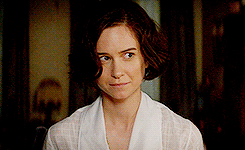
Part of the lack of Newtina is no doubt because of how dirty the second and third film did Tina/Katherine - you’ll never convince me that it’s a pure coincidence that JK went from “Tina is my girl” and shouting Katherine’s praises to reducing her role to a tiny cameo in SoD after Katherine publicly posted her support for trans people. Her slightly reduced role in the second film was more down to there being far too many characters and plot lines so NONE of the characters got the focus they needed, but the third film…that was definitely intentional. People have tried to blame Katherine getting COVID in March 2020 for it when the film didn’t start filming until September 2020, by which time both Jude and Katherine were doing press for The Third Day show and she was talking about her experience with COVID. The way Katherine refused to promote SoD (to the point of attending the London premiere to sign things for fans and hang out with Eddie, posting photos of herself at the premiere but NOT mentioning the film at any point or tagging it in her post whilst still tagging all of her stylists/make up people/brands) speaks for itself.

I am upset because Tina was my favourite character when I watched the first film, so much so that I cut my hair into a bob, cosplayed as her, my first tattoo was her wand, I bought her locket, etc. I literally saw so much of myself in her that it was a little bizarre: the older sister whose younger sister is more bubbly/sociable/considered the pretty one and who baked/cooked, the shyness, the sense of duty, the willingness to break the rules if it went against her moral code… I saw a lot of myself in her, more than I did any other character, and I was so excited to see what happened with her character next.
Most importantly, however, I am upset because while JKR is a horrible human being who I despise with all my heart, we’ve lost positive autistic representation in Newt Scamander.
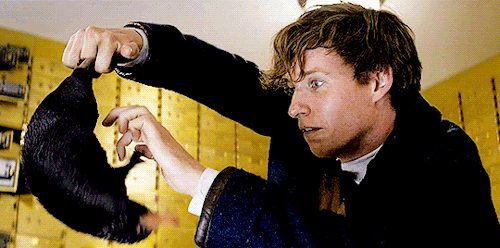
I’ve spoken before about how finding out Newt was played by Eddie as autistic helped me come to terms with and feel proud of my own diagnosis between 2019 (when I first got referred) and 2022 (when I finally got my letter confirming the diagnosis). Seeing Newt be the hero and not be treated like a joke for being autistic meant (and still does mean) the world to me - and I know it meant so much to a lot of us who are on the spectrum who watched the film and saw ourselves in Newt, who saw ourselves be the hero for once. I remember going to see SoD on opening day with my sister and seeing a young boy on the row in front getting so excited at seeing Newt that he flapped his hands excitedly and bounced in his seat. I remember getting emotional when I noticed Newt stimming with his coat pocket multiple times. I still think about how I was lucky enough to thank Eddie in person for playing Newt as autistic.
It’s just another reason that I hate JKR - her bigotry (as well as the subpar writing in the second and third film) undeniably contributed to people boycotting the film, which has meant WB has discontinued it - and we will no longer see an autistic person as the hero. Her decision to go down the rabbit hole of transphobia (and a number of other different prejudices) is absolutely a contributing factor in the decision to cancel the series, and because that’s a reason more personal to me, I will always hate her.
(I already hate her anyway just for the fact she is in fact a despicable person)
#fantastic beasts#fantastic beasts and where to find them#fantastic beasts: the crimes of grindelwald#fantastic beasts: the secrets of dumbledore#newtina#newt scamander#tina goldstein#porpentina goldstein#queenie goldstein#jacob kowalski#albus dumbledore#gellert grindelwald
74 notes
·
View notes
Text
Lucy Steel, Karma, and 'the flow of fate': The flaw of the 'napkin philosophy'
I've stated before that Johnny, Gyro, HP and Diego stand out as the four main-ish characters of SBR. But that's neglecting to mention the true third protagonist of the part: Lucy Steel. Lucy's character is used to explore a lot of the heavier and more complex themes of SBR, including the nature of power, fortune, and even free will (as well as misogyny, to a lesser extent). I hope to touch on and elaborate what I think the text is trying to demonstrate with Lucy's story. Unfortunately there was limit to the panels I could include, so if you'd like to double check my analysis please reference the referred chapters.
Content warning for reference to events in the Both Sides Now chapters as well as Valentine's general attitude towards Lucy.
To understand what Lucy represents, we've first got to understand Lucy. So, let's take a quick look at her backstory.
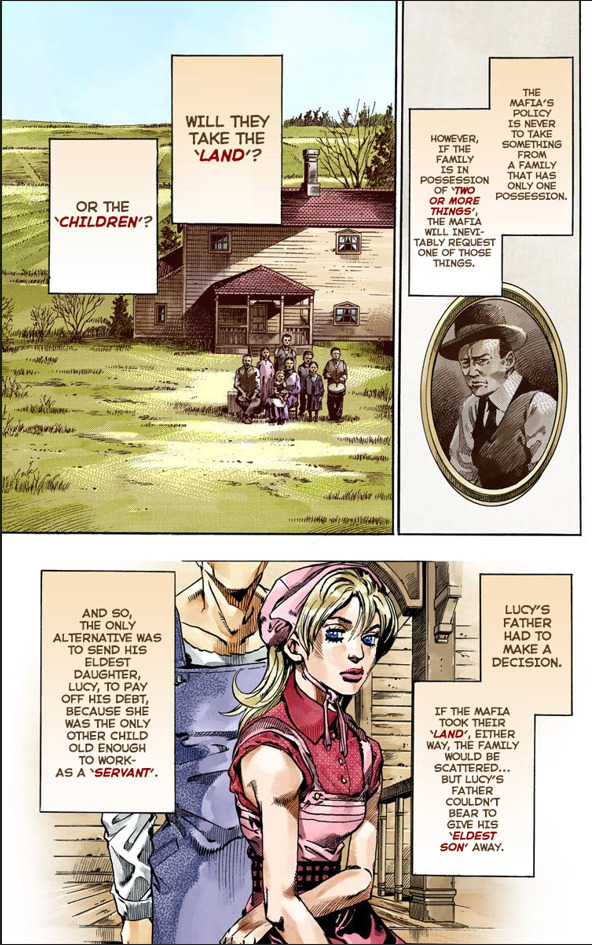
Chapter 61: Both Sides Now (Part 2)
Born into a poor family, even from a young age Lucy was forced / expected to pay for the sins of her father. In those days it's no surprise that the life of a son was seen as more valuable than that of a daughter. Lucy's father decides that Lucy must be the one to pay for the family's debt. It's implied that Lucy does not protest this decision and understands her father's reasoning (even if internally she may be more upset about it than she appears). Lucy's go-to mechanism for dealing with the stress of the people around her is to 'look after them'. She repeatedly puts on a brave face in order to comfort them first. Only when she's alone does she allow herself to express her true feelings. Even the inciting incident of the Steel Ball Run race itself - a young Lucy comforting a hopeless Stephen - is demonstrative of how she always looks after the people around her.
Lucy has always been forced to bear the responsibilities of others, as the second eldest and the eldest daughter.
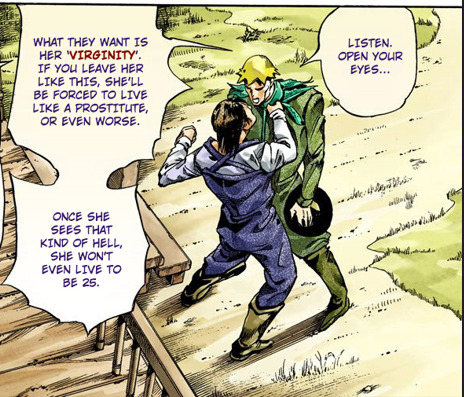
Chapter 61: Both Sides Now (Part 2)
Her father was either naive or unwilling to accept the consequences of what he'd done to Lucy by essentially selling her to the mafia. Stephen forces Lucy's father to recognize the reality of the situation - and as such becomes the first person we know of to demonstrably care for Lucy's well being. In my opinion, one of the reasons Lucy doesn't ever seem put off by the 'marriage' between her and Stephen is because she knows that without Stephen she would literally be dead. It was Lucy's kindness to Stephen that would influence Stephen to return to her family and save her life. This is the first (chronological) example of Lucy's complex relationship with fate and fortune.

Chapter 28: Scary Monsters (Part 1)
After witnessing Valentine's odd power in a previous scene she grows suspicious, and given the talk of murder at the time, likely worried for Stephen's safety. While attempting to assuage her suspicion she catches a glimpse of the corpse part Valentine possess, and from then on gets caught up in the larger machinations of the race. However, even this first encounter between Lucy and Valentine showcases what the dynamic will be between them as the part continues: Valentine, bombastic and ambitious, contrasted with Lucy. Lucy is meek, but her actions have an overt influence on the plot, even if none of the other characters realize her true importance until later. Her impact is subtle but pervasive, as she continually changes the entire course of the race despite never being acknowledged as a factor in play until the very end.
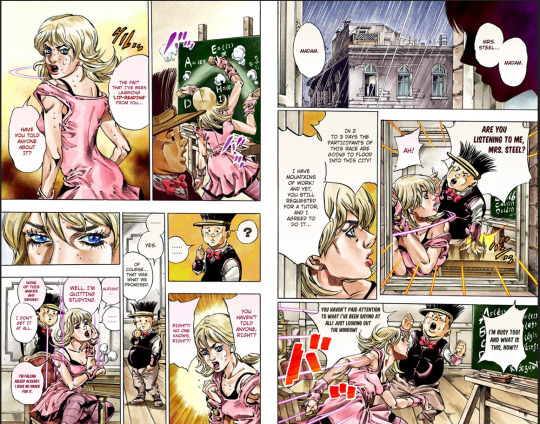
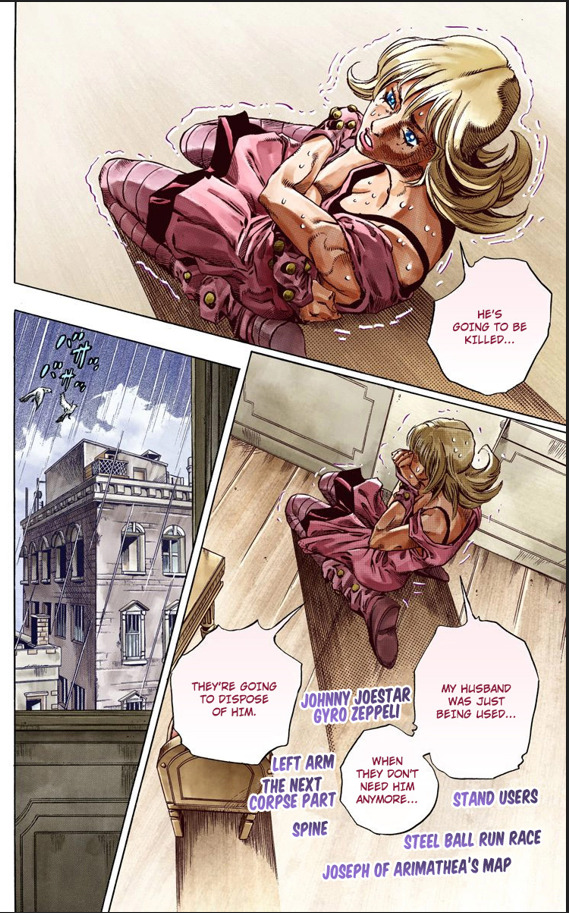
Chapter 36: The Green Tombstone (Part 1)
Lucy is a non-stand user, a normal person and a teenager at that, who realizes in this moment that her now peaceful life can be shattered again. Lucy is a normal person, but she is brave, and she is determined to protect the person she cares about at any cost.
Lucy clearly feels a lot of responsibility towards Stephen, and most of the time is quite a serious person. There's a lot happening internally that she can't or won't let others in on. In other scenes, we see that Steven often tells her to lighten up and act more her age, but Lucy can't let that sense of responsibility go. In the scene above, her serious nature is contrasted by her apparent flippancy towards her teacher. To avoid any questions on her intentions, she flips on the 'bored student / teenager' act - and it is just an act. As soon as she's alone, Lucy breaks down, because her strong face too is an act.
On a thematic level it's already clear that Lucy's character will be closely tied to the concept of 'fate' (most of the time represented through Valentine). Here, she is determined to avert what she suspects Stephen's ultimate 'fate' will be. She knows that she is not powerful, yet still she struggles against the overwhelming powers around her. Even with something as simple as learning lip reading, she's taking the initiative against Valentine, at a point when no other major character knows that it's Valentine they're up against. I also want to recognize her intelligence: she is totally overlooked by the President's staff (men) and uses that to her advantage to royally fuck up Valentine's plans.
Luck, or 'fortune', plays a notable role in enabling Lucy's escape from Valentine and Blackmore's pursuit. It's only by chance that Lucy is the one to look up and notice Blackmore first.

Chapter 37: The Green Tombstone (Part 2)
Lucy is forced to involve Mountain Tim in her escape - who just so happens to be in town and nearby the government building while all of this is going down.
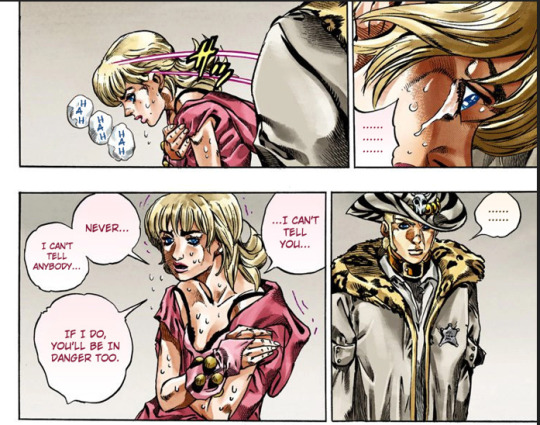
Chapter 37: The Green Tombstone (Part 2)
We see here again Lucy's strong sense of responsbility, as well as her selflessness. Despite not knowing Mountain Tim very well, she worries for his safety. She takes burdens onto herself because she feels she must; she can't let anyone get hurt, because it's her responsibility to protect them.
However, the fickle nature of fortune is again evident in the next few scenes. As soon as Tim separates from Lucy, he's killed; meanwhile, Lucy has the good fortune of making it to the backbone before anyone else, as well as having the distance shortened for her. Even when Blackmore catches up to her, 'fortune' is again on Lucy's side, and she's able to take him by surprise and reclaim the corpse. Even this early on, the text seems to suggest that the corpse wants Lucy to posses it; in a sense it's manipulating even to ensure it's delivered (by her) to where it wants to go.
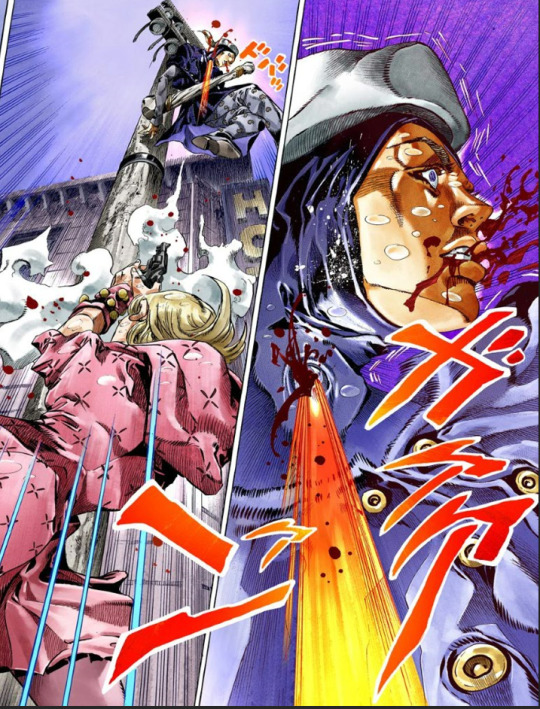
Chapter 38: Catch the Rainbow (Part 1)
Oh nothing, just Lucy being cool as fuck.

Chapter 39: Catch the Rainbow (Part 2)
Tim directed Lucy to Johnny and Gyro. They are the first people she ever asks for help (and politely, at that). Notice that Lucy isn't even necessarily asking them to help her. She's asking them, really, to help Stephen.

Chapter 39: Catch the Rainbow (Part 2) (Johnny already decided to protect Lucy <3)
Blackmore basically singles out Lucy to lecture her on 'sin' - which in this case is taking the initiative and daring to touch a corpse part.
Blackmore's monologue is based almost entirely on religious ideas, and we see again how misogyny ties into Lucy's character. Lucy is compared to an adult woman, 'Eve', and told she is the embodiment of 'sin' (often a metaphor for sexual temptation, and perhaps foreshadows Valentine's assault and views about Lucy as an object later in the part). Because she dared to do something about her situation and on her own initiative, Blackmore demands that she 'repent'.
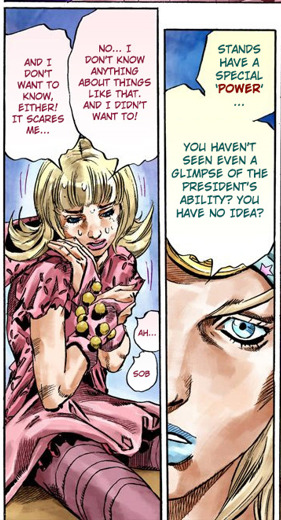

Chapter 40: A Silent Way (Part 1) (Johnny: "Who'll come to her if she fails?" (you will mr. joestar)
Gyro, and to a lesser extent, Johnny, are unwilling to give up the race to chase after Valentine. Gyro asks Lucy plainly what she expects her life to be like if she runs away now, and if she will be happy to live the rest of her life in fear. Knowing that she will never be happy with such a life, Lucy agrees to put her life on the line and assumes the burden of stealing the corpse part from Valentine.
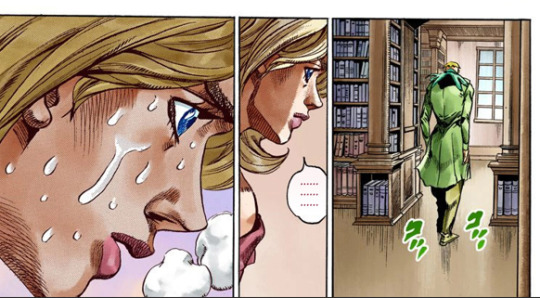
Chapter 48: Tubular Bells (Part 1) - as soon as Steven is out of sight she drops her brave face :(

Chapter 48: Tubular Bells (Part 1)
Lucy's intelligence is again demonstrated through her plan to get close to the President; namely, getting close to Scarlet first. It works, thanks to some outside help from HP (and I plan to do an analysis of their relationship in another analysis). However, during her conversation with HP, HP makes it clear that they are not helping her 'as a friend', but just as someone after the same goal. Lucy is, once again, on her own. HP's advice to her is to 'stiffen her resolve'.
The bottom line is that Lucy must take absolutely insane risks to get the happiness and peace she desires, and though she falters she does not stop.
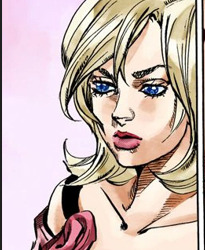
Chapter 49: Tubular Bells (Part 2) - she wants out of this subplot
At the end of Tubular Bells, Lucy literally kills Scarlet (power move) and HP takes the fall for her. However, this leaves Lucy is a very precarious situation. It's during this section of the story that Lucy's connection to fate, fortune, and karma become most evident. It's through her character that the flaws of Valentine, in both his character and his philosophy, are brought to light.
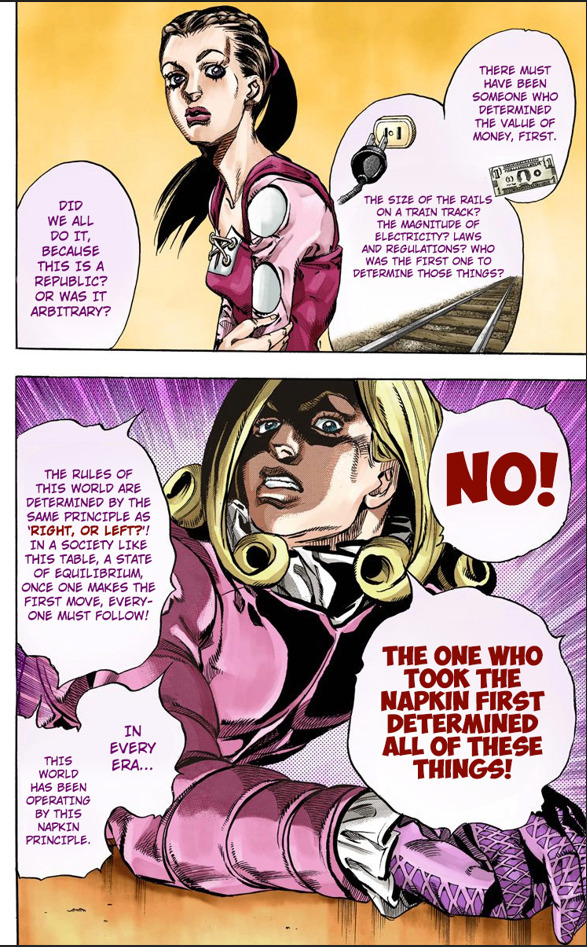
Chapter 61: Both Sides Now (Part 2)
In Valentine's view, the one who acts decisively and 'takes the first napkin' is the one who will influence in the rest of the world. It's a one-way perspective; power goes outward. The one who takes the napkin determines the flow of fortune for everyone else; hence why he absolutely must be the first to take it.
Y'all know what happens in this section, so I won't go into detail. All you need to know is that this situation clarifies to Lucy is exact nature of the power she's up against, and how powerless she is in comparison. On the surface, she loses hope of 'changing fate' - though she doesn't stop fighting.
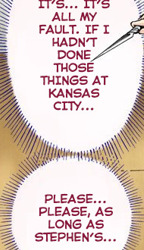
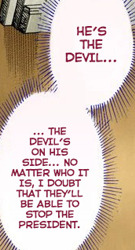
Chapter 62: Dirty Deeds Done Dirt Cheap
After Lucy manages to briefly get away, she thinks to herself that Valentine is the 'Devil' - and yet despite that, ascribes the fault of the situation to herself, for her 'sin' in Kansas City (the 'sin' ascribed to her by Blackmore). While Lucy, like Johnny, thinks that Valentine might be unstoppable, she doesn't attribute that to the corpse (and thus fate / fortune) choosing Valentine; she attributes it to Valentine having evil incarnate on his side (and in a sense, he does, being gifted with a stand like D4C).
Lucy ends up captured, but in the process is 'chosen' by the corpse. Valentine takes this to mean that, because he was the one who collected the corpse, it has therefore chosen him - and that Lucy, as it's chosen host, must succumb to Valentine's interpretation of the corpse's decision. He takes away her agency and attempts to convince her that 'this is the way things are supposed to be'. Master manipulator and gaslighter. Lucy is a vessel for him to exercise his power on, via the corpse.

Chapter 71: Ticket to Ride (Part 1)
Allow me to briefly digress to talk about Tear Cutter as a stand. Some people joke that Tear Cutter is a useless stand, but the point is not that it can cut things - it's that whatever is cut is inflicted with karma. It's this 'karma' that represents Lucy's resistance to Valentine's 'napkin philosophy'.

Chapter 73: D4C (Part 6)
Valentine asserts that Lucy's only choice is to surrender herself to the 'flow'. To him, and to powers greater than herself (fate / 'the flow'). That is, Valentine's belief of what the 'flow' is. Basically, let him do what he wants and accept that she never had agency (because fate has always chosen Valentine, and it's her destiny to serve him through the corpse). This is Valentine's mistake: he sees power / fortune as a one-way flow, and believes that because he has 'taken the first napkin', he will not be subject to the power of anyone / anything else (including fate itself - because Valentine now controls fate, obviously).
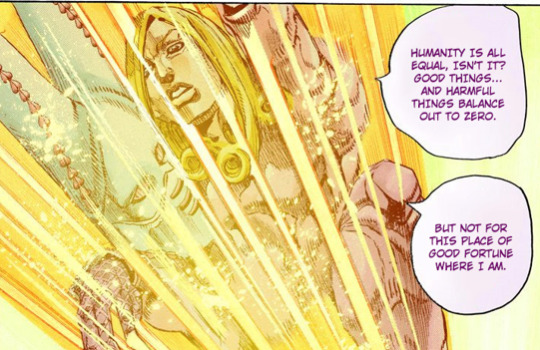
Chapter 79: D4C (Part 12) - Love Train
Valentine insists that the corpse will allow him to turn even 'bad luck' into his ally - that is, to overcome the forces of karma. He's talking about karma and 'balancing things to zero', but he's still envisioning himself as someone in control of that power, and therefore as someone not subject to its laws. Through 'taking the first napkin', Valentine views himself as the one now in control of the world and puts himself in the position of God. The corpse does appear to 'ally' itself with him by incapacitating Lucy and manifesting Love Train; but is that really what's happening? Or is the truth that Valentine is just as despotic as the people he claims to hate, and has usurped her power for himself?
But as before, Lucy's resistance to the Powers that Be is subtle but impactful. But, although subtly, Lucy's 'good karma' overcomes Valentine's malintent. Her use of Tear Cutter on her skirt allows for Diego and HP, and consequently Johnny and Gyro to find her.
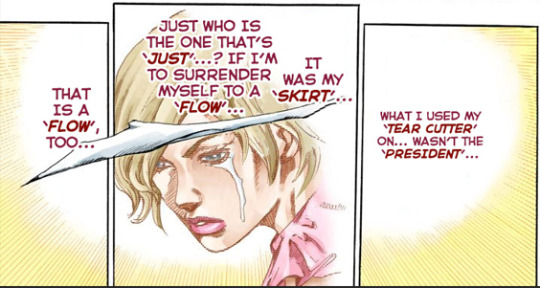
Chapter 73: D4C (Part 6)
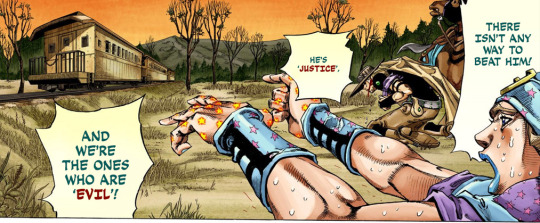
Chapter 79: D4C (Part 12) - Love Train
I want to again point out the parallel between Lucy and Johnny here. Lucy too questions whether Valentine is the one that is 'just' - despite having herself called Valentine the 'devil' - because Valentine appears to be the one 'chosen' by the corpse. However, I'd like to note something: everyone in the race was after the corpse because they believed that, when completed, it would grant them the power to do whatever they wanted to accomplish. Personally, I think that perspective is the most accurate interpretation of the corpse's power. Everything Valentine says about being 'chosen' are his own delusions of grandeur.
Throughout the final act, Lucy is reduced to what Valentine sees her as: a vessel for his will, whether that be to carry his children or house the corpse. His will being imposed on her - though he claims it to be the will of the corpse - quite literally begins to tear her apart.
Chapter 72: Ticket to Ride (Part 2)

Chapter 74: D4C (Part 7)
However, although she has suffered immensely under the burden placed on her by Valentine and the Corpse, the 'good' that Lucy put out into the world (via her attempts to save Stephen) come back as 'good fortune' for her. Stephen manages to save Johnny's life by pulling Valentine away, and begs for Gyro to save Lucy from Valentine. Stephen recognizes the situation for what it is - should Lucy truly 'accept the flow' and surrender herself to Valentine, she will die in every way that's important. Karma, in the broadest sense, is again working against Valentine (though he believes himself above it).

Chapter 81: D4C (Part 14)
Stephen's actions seem to hint towards the truth - the farther Lucy is from Valentine, the healthier she gets, and the weaker Valentine becomes. What the narrative is showing is that the corpse is not a force meant to be owned by anyone. It literally kills the person it (allegedly) chooses as a host. Valentine exercising his will and power over Lucy via the corpse erased her identity and allows him to cheat, but the narrative proves that by doing so, he is committing evil and condemning an innocent girl (among many other innocents) to death.
Gyro's death is yet another example of the cycle of luck. He saved Johnny and cornered Valentine by allowing Lucy to ride his corpse, but at the same time essentially sealed his fate (because Lucy was on his horse). His fortune ran out as the corpse cycled it, taking away his 'goddess of victory'. I think this solidifies that, ultimately, there is no real way to sway fate and fortune to your side. Gyro and Valentine make up thinks like 'goddesses' because they want to believe they have some control over the outcome of events, when the truth is that the karmic cycle will affect everyone equally.
When Valentine is defeated, the corpse begins to separate from Lucy. Since we're shown that it can obviously exist without a host, this is, I think, another piece of evidence that it was Valentine's desire that caused the corpse to 'chose' Lucy. Valentine told Lucy to give in to him / the corpse several times; but Lucy's perseverance and determination won out, and Valentine's bad karma finally caught up to him.
The narrative concludes with Valentine's defeat, and tells us, without room for debate, that Valentine's belief in the 'napkin philosophy' is incorrect - because it is a philosophy that makes the assumption that an inequality of karma exists. The 'first napkin' is taken at a round table - i.e. the cycle of karma. The bad you put into the world will come back to you. If you do harm unto others, then you will inevitably have harm done unto yourself. It's the second part of the statement that Valentine rejects, and the second part of the statement that the narrative enforces by having Love Train ('one-way power') fail in the end, to the power of infinity (or, if you want to think of it another way, an infinite cycle...)
And in the end, separated from the corpse and wrapping up the last of Valentine's machinations, Lucy is able to take back control of her narrative.
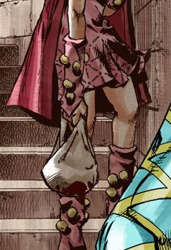
Chapter 95: World of Stars and Stripes
This scene is not just Lucy reclaiming her independence and power, but the final emphasis on the nature of 'karma' and fortune (and fate). Because base!Diego pursued Lucy and the corpse, he died to Valentine. Because Valentine didn't want to lose, he brought AU!Diego to the base world. Because base!Diego died to Valentine in pursuit of Lucy, Lucy has the means to defeat AU!Diego. In a way, Valentine karmically inflicted this ending on himself, and I think Lucy understands that.
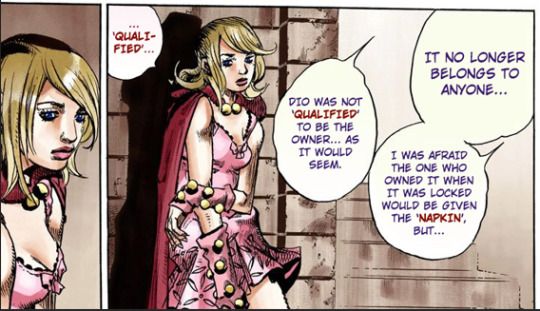
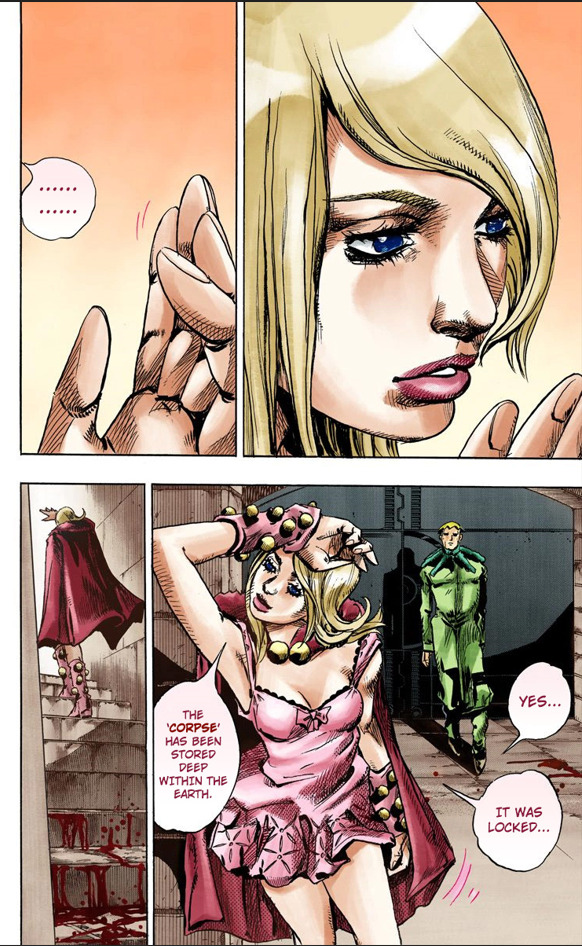
Chapter 95: World of Stars and Stripes
Please remember that AU!Diego never turns the key to the vault. Lucy does. Lucy echoes' Steven's theory, that someone need be 'qualified' to own the corpse. In my reading, I believe that the conclusion that Lucy came to was that no one can be 'qualified' to 'own' the corpse. No matter who owns the corpse, their 'good fortune' will run out - because karma finds everyone in the end. Lucy understands that the corpse cannot truly be an ally to anyone, because the corpse itself is a principle - the principle of karma. She's the one to lock away the corpse, and, almost as if in thanks for the good such an unselfish action will do for the world, Lucy finally gets her happy ending.
In conclusion: Lucy empowers herself to find happiness with her own hands. Even without a Stand, even without being chosen as an 'ally' to the corpse (and instead being designated as its vessel), Lucy succeeded. Maybe she wasn't 'qualified' - she demands no respect when she walks in a room, she doesn't exert her will onto others - but she realizes that she doesn't need to be 'qualified' to deserve a happy ending.
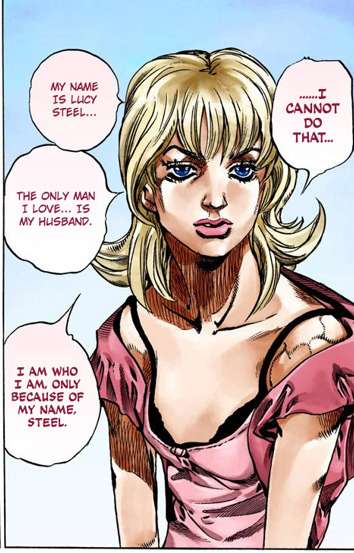
Chapter 37: The Green Tombstone (Part 2)
Girl of Steel ^_^
I hope this analysis is fairly coherent, it was a bit rough to put together. If you got this far, thanks for reading!
#lucy steel#sbr#steel ball run#funny valentine#diego brando#stephen steel#oh mountain tim what you couldve been...#but this aint about him its about her <3#sbr analysis#my posts
36 notes
·
View notes